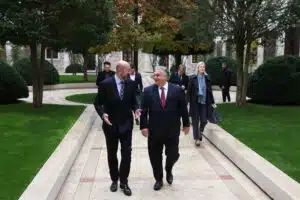Brussels – Mario Draghi. The name of the former ECB man is resurfacing in Brussels, but this time not as the next president of the European Commission. Mentioning him among the possible candidates for the role of head of the European Council —successor to Charles Michel who has just announced a step back to run in the European elections—is the Financial Times this morning citing diplomatic sources in Brussels.
Michel’s announcement to resign from office in advance has accelerated political negotiations for his succession, especially to avert the possibility that the next president of the EU Council (the institution that brings together the member states at the ministerial level), the Hungarian premier Viktor Orbán, will lead the European Council on an interim basis.
Budapest will inherit the six-month rotating presidency of the EU starting the first of July, while the new European Parliament will take office in mid-July, the last date Michel could remain president. To rule out the Orbán hypothesis, in the event of a failure to agree on a strong name, the heads of state and government of the Twenty-Seven could also name an interim president to lead up to the natural November deadline, but it would not be Draghi, who, according to an official quoted by the Financial Times, would be unlikely to accept an “expiring” role. This, however, would not be a problem: the new appointee can take full office the same day Michel resigns for the two-and-a-half-year (renewable) term.
Standing in the way of Draghi’s name, which seems to be supported in particular by French President Emmanuel Macron, may be the “non-political” dimension of his name. 76 years old, Draghi is the former president of the European Central Bank credited with saving the euro from crisis. As Italy’s premier, he retired from political life at the end of 2022, when the country went to early elections that led to the appointment of Premier Giorgia Meloni. Draghi in Brussels has a name with a weight of his own, so much so that the European Commission has entrusted him with writing a report on industrial competitiveness that should be presented after the European elections.
Specific weight, that is undoubted. But Draghi, compared to other names on the list, is not a member of any of the major European political parties, and this is a non-negligible factor in the nomination of the president of the European Council (as well as other institutional roles). So much so that the Financial Times itself mentions among other possible candidates the premiers of Spain and Denmark, Pedro Sanchez and Mette Frederiksen, who, compared to Draghi, would instead have the political backing of the Socialists, although the Spaniard was a candidate before he succeeded in forming a government in Madrid, and now he may no longer be interested. Also being considered is the name of Antonio Costa, the resigning premier of Portugal, who would be an excellent candidate, partly because he is from “Southern” Europe, after two Belgians and a Pole at the head of the Council, but right now his position is weak because of the judicial investigation involving some people on his staff, although not him personally.
All names from the political family of the Socialist Democrats, who are vying for the position of president of the European Council (currently held by a Liberal) in the next legislature, having had, in the last three legislatures “only” the high representative for foreign policy, a prestigious office but not comparable to those in the commission or the council. The commission at the moment seems to remain the prerogative of the EPP, and therefore the ESDP, being the second political force in Europe, claims more space.
According to Italian sources, the Meloni government would be ready to support Draghi because of the “excellent personal relationship” between the two, but not other socialists such as the current European Commissioner for the economy, Paolo Gentiloni, or former premier Enrico Letta.
“Draghi can do very well in any top position in the European institutions, my position is firmly yes,” Renew Europe MEP Sandro Gozi commented to Eunews. “I think Michel’s choice should push everyone to anticipate discussions and decision; the new post-election Europe must decide as soon as possible all the top positions considering all the internal and external challenges. We have to choose the best names and make ambitious choices, not downward compromises, and we should not let weeks and months pass for the choice.”
For Forza Italia MEP Salvatore De Meo on the other hand, it is “inappropriate to discuss at this time positions and leadership related to the European institutions, especially considering that elections will be held in June and only then can negotiations and agreements be undertaken on the matter.” De Meo is part of the political family of the European People’s Party (EPP). “Despite his prominent role in the history of the EU, Mario Draghi’s name is often the subject of speculation, although sources close to him currently deny seeking office,” he adds, stressing that it is “unquestionable his value and ability to lead the ECB with foresight, successfully defending the euro and contributing to a more solidarity-based vision of Europe, especially from the macroeconomic point of view. I reiterate that, in any case and as is right, it will be necessary to wait for the results of the European elections in June and to observe how the negotiations and arrangements for the EU summits will develop,” he concludes.
English version by the Translation Service of Withub







